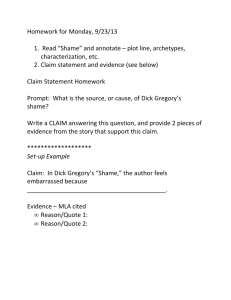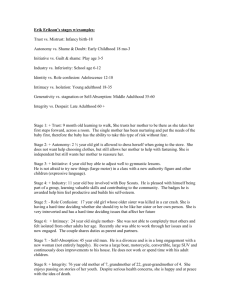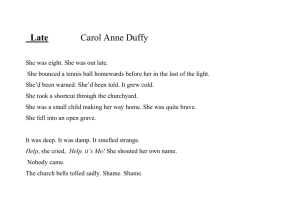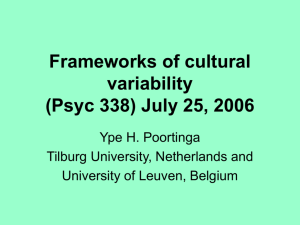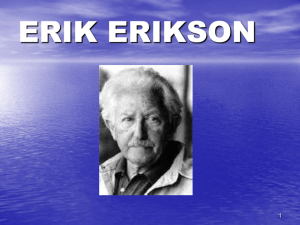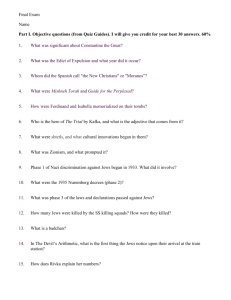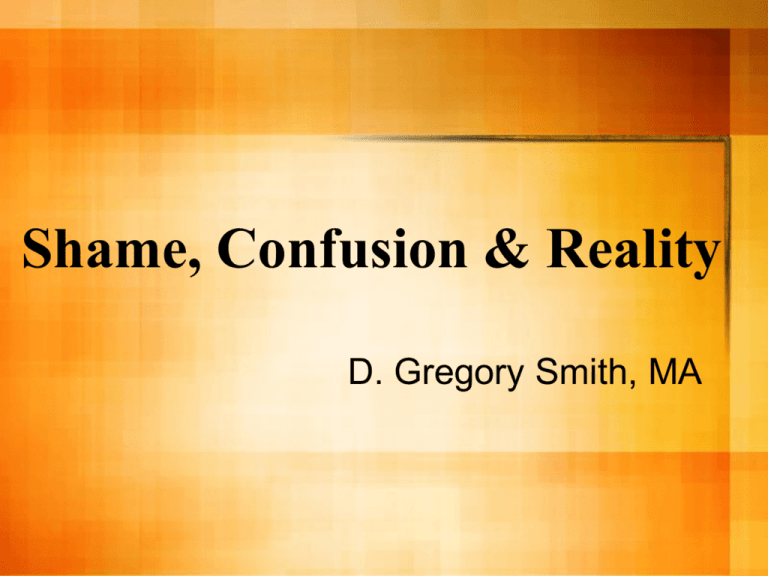
Shame, Confusion & Reality
D. Gregory Smith, MA
Most LGBT persons deal with
life on a different level than the
General Population (GP)
We daily face prejudice, ignorance, anger
and even violence-that creates fear.
We often grow up in environments that
shame us, either directly or indirectly.
That shame influences our choices and how
we see the world and ourselves.
Shame can prevent us from forming
satisfying relationships and communities that
support us.
Quick Guilt & Shame Primer
Guilt comes from inside- “I did
something against a value I hold, so I
feel bad.”- Can be helpful.
Quick Guilt & Shame Primer
Guilt comes from inside- “I did
something against a value I hold, so I
feel bad.”- Can be helpful.
Shame comes from outside-”You did
something against a value I hold, so you
are bad.”- Not so helpful
Quick Guilt & Shame Primer
Guilt comes from inside- “I did
something against a value I hold, so I
feel bad.”- Can be helpful.
Shame comes from outside-”You did
something against a value I hold, so you
are bad.”- Not so helpful
Internalized Shame: “I am/do things
that go against values of people/
institutions I value or must respect, so I
am bad.”
-Not helpful at all.
Internalized Shame creates a
powerful Alternate Reality,
where Fear becomes the
primary force in a person’s life.
Fear of rejection- social, romantic,
religious, political.
Fear of pain, emotional, physical.
Fear of failure.
Fear of inadequacy.
When a person believes this
shaming, there are some
natural confusions…
And, in my experience, some apply
dramatically to LGBT persons.
We can confuse:
Sex
and Intimacy
Makes senseIf we believe the residual shame- we
don’t deserve love- we’ll settle for sex
As a persecuted minority, our habit is
not to self-disclose easily- relationships
become VERY hard work.
Sex is EASY. (relatively)
Because we’re not well-schooled in
intimacy, we can confuse it with sexboth feel good.
Barriers to intimacy:
Low self-esteem
Lack of kno wledge re: LGBT relationships,
dating
Perceived lack of role/behavior models
Stereotypes perpetuated by the LGBT
community
Substance-induced/assisted socializing and/or
sex Guilt/Shame
But, we still want what everybody wantsΙ.
We want to be loved and accepted.
A majority (68-87%, depending on study)
ideally want so me type of monogamous
relationship.
Many want to be married.
Many (single & couples) want chil dren.
We can confuse:
Sex
and Intimacy
Safety and Secrecy
With good reason LGBTIQ
teens are 4 times more
likely to attempt suicide than the
general population.
Crimes of violence against
LGBTIQ persons a reality- not
covered by MSM (Mainstream
Media).
Safety is perceived as
Keeping my secret- hiding in plain sight
-not betraying my real feelings or natural
behaviors, mannerisms, etc.
Not being
public
Avoiding contro versy
Not causing myself or others discomfort
Avoiding pos sible life-threatening situations
We can confuse:
Sex
and Intimacy
Safety and Secrecy
Intoxication and Happiness
Some stats:
LGBTIQ persons are 3X more likely to be
depressed/anxious than G.P.
Self-medication w/ alcohol, drugs, sex.
Less
likely to seek mental health/ addiction
treatment because of shame/safety issues.
More likely (3X) to abuse substances, less
likely to abstain, more likely to continue
heavy use later in life (NALGAP,2002).
We can confuse:
Sex
and Intimacy
Safety and Secrecy
Intoxication and Happiness
Youth and Value/Desirability
em
Youth-centered cult ure.
LGBT pe rsons over 50 are 2X more likely to
have low self-esteem than the G.P. (NIMH,
2004)
Jealousy/Envy older÷ younger.
Terms of derision for elders- TrollΣ,
ickenhawkΣ, others?
We can confuse:
Sex
and Intimacy
Safety and Secrecy
Intoxication and Happiness
Youth and Value/Desirability
Tolerance and Success
Professional life
Can simply be happy to not be bashed, berated,
outed or s hamed- no perspective.
Success in many professions is too risky- hard
to stay/feel safe in the light of heavy
scrutiny/pressure/judgment. Not legally
protected. Unspoken discrimination.
DonΥt n
eed one more thing to make them
choose someone else over me.
Choose unfu lfilling, menial jobs to be safeΣ.
Role models for Success?
We can confuse:
Sex
and Intimacy
Safety and Secrecy
Intoxication and Happiness
Youth and Value/Desirability
Tolerance and Success
Chronic Illness and Health
Chronic Illness seems normal:
Depression/anxiety are rampant in LGBhigher for Transgendered persons- yet we
rarely seek help.
Ditto drug and alcohol abuse.
Ditto suicidal thoughts or feelings.
*Gay/Bi population are 50 times more
infected with HIV than the G.P.!
settle for “not dying” rather than health.
lost sense of activism?
Infection still happens, HIV as “gay disease.”
We can confuse:
Sex
and Intimacy
Safety and Secrecy
Intoxication and Happiness
Youth and Value/Desirability
Tolerance and Success
Chronic Illness and Health
Abuse and Affection
LGBT Domestic Violence/Abuse
Same as MW, 25%, -but not as open.
Stigma of same-sex partner abuse not as
great as opposite-sex abuse more fair.
Shame again- hard to admit being abused by
a partner- esp. in small town/peer group
Men & Trans especially have difficulty
recognizing abuse- Gender in question.
Psychological/emotional abuse just as
damaging control.
Existing services not helpful- used “secretly”
These are some of the
confusionsNow let’s get to Reality.
Who are we? What are we?
We are wounded people.
And we have several choices.
We can remain ashamed, confused
and hurting- self-medicating with
denial or chemicals or sex when it
hurts too much…
Or, we can face the truth and start
healing.
I asked a random sampling of
friends and associates in
Montana to share their truth
about the LGBTIQ community
in Montana:
The questions:
What is your perception of the
LGBTIQ community in
Montana?
What do we need?
Almost all of the responses I
received were critical:
“LGBT Community” is a myth.
Some are not “out” and not supported where
they are- derided for staying closeted- we
can forget it’s a hard process.
We pretend HIV is not issue in Montana.
Alcohol and drug use is high here- much of
“community” involves bars/alcohol.
We do not respect or go to our Elders.
We are “cliquish”.
We are tolerated, not accepted.
More…
“Shallow”- party lifestyle- not good at
budgeting, planning for retirement. Few
financially stable role models.
Not all LGBT people are liberal Democrats.
We are not all white and “perfect.”
We are not willing to look at the full spectrum
of masculinity/femininity and accept it.
People in MT have guns- I can’t be myself.
All the young people go to the cities/out of
state (and not interested in “real issues”).
“ ’We’ ignore or mock Bi or Trans people”
Still more…
Montana Lesbians don’t appreciate/support
women who aren’t “tough”.
We don’t encourage friends to be safe- and
not just sexually. We drink & drive, etc.
We don’t take care of each other, just our
friends.
Too much sex and not enough friendship.
I’m more afraid of LGBT peers than the rest
of society- they can hurt me more. We’re
mean to LGBT people not in our group.
Any others?
Is this an accurate
picture of our Reality?
How do we change this?
Some constructive responses(Which I condensed…)
*Find
real reasons that our fortunes
rise and fall together. We’re not
convinced we need each other. We’re
isolated and lonely.
A good, central, unified Web presence.
Give people something to come out to/for.
Work at creating community by challenging
stereotypes perpetuated by our own.
Reality: “We judge each other by stereotypeswe of all people should know better”
“Acknowledge/ include the Two-Spirit people.”
Men and Women should socialize more.
More…
Real assessment of safety- not fear based.
Be more supportive of others’ relationships
and friendships.
Ask for help when we need it- queer
education.
“We need emotional safety and intimacy and
empathic communication in non-substance
fueled settings”.
“We need to learn to stand up together, then
we won’t be so afraid”
“Something to bridge the long distances”
Our greatest enemy is fear:
fear of pain, violence,
vulnerability, shame and
isolation- and like all fear,
it is greater in our minds
than it ever is in Reality.
Our job is to steadily conquer
fear
by firmly and gently
speaking the truth,
both to ourselves and to the
worldthe truth of who we really are.
2009 by D Gregory Smith, all rights reserved

